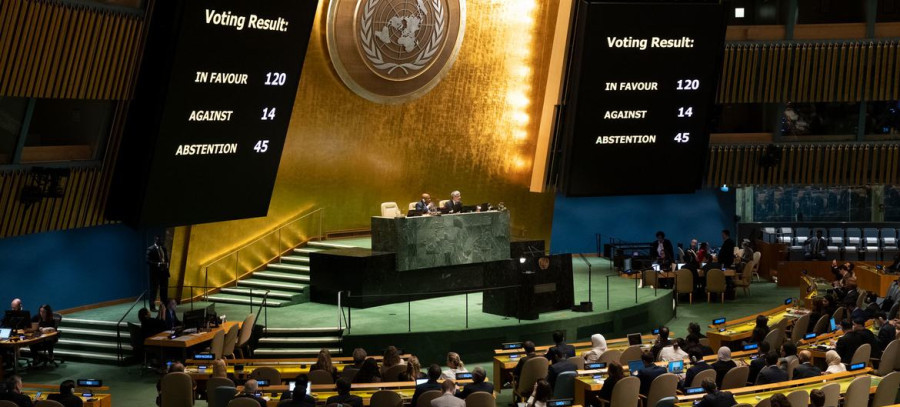Editorial
The vote against Israel
Having faced multiple blockades, Nepal cannot be indifferent to the plight of the people of Gaza.
Following the overthrow of the hidebound Rana regime and establishment of the country’s first democratic government in 1959, Nepal was eager to expand its diplomatic wings. In the eyes of the new Prime Minister BP Koirala, if his landlocked country was to overcome its geopolitical constraints, it was vital to reach out to possible friends all around the globe. Meanwhile, Israel, since it formally came into being in 1948, was desperately looking to build support for the Jewish state that had sprouted in the heart of the Muslim world. So Koirala did not hesitate to establish diplomatic ties with Israel in 1960, making Nepal the first country in South Asia to recognise “the right of Israel to exist within secure and internationally recognised boundaries,” which, in fact, remains Nepal’s official stand to this day. Apparently, Israeli diplomats rather ruefully recounted the same history with their counterparts in Kathmandu after Nepal, on Friday, joined six other South Asian states to vote in favour of a United Nations resolution calling for an immediate cessation of hostilities and unhindered humanitarian access in the Gaza Strip. (India abstained from the vote.)
The UN General Assembly adopted the resolution titled “Protection of civilians and upholding legal and humanitarian obligations,” with 120 nations voting in its favour, 14 against, and 45 abstaining. Clarifying its reason to abstain, India said the resolution failed to mention the October 7 ‘terrorist’ Hamas attack on Israel, a position other abstainers and nay voters also took. But then Pakistan’s ambassador to the UN Munir Akram was bang on that the resolution had made no mention of any of the belligerents in the ongoing Israel-Hamas conflict. If Hamas was to be mentioned, so should Israel, he reasoned. Who was or was not mentioned in the motion is a side issue though. What the Hamas terrorists did on October 7, killing up to 1,400 Israelis in cold blood, is inexcusable and those who partook in the crime must be made to pay. Yet the fact remains that over 7,000 Palestinians, many of them women and children, have already been killed in retaliatory Israeli bombardments in the Gaza Strip. The fatalities in Gaza could soon multiply as Israel begins its ground offensive.
Israel has cruelly cut off supplies of vital fuel and food into the area, even as it arbitrarily continues to drop bombs. Nepal, as a nation precariously sandwiched between two big powers, and one that has itself witnessed multiple blockades, cannot remain indifferent to the plight of the 2.3 million ‘blockaded’ people of Gaza who have absolutely nowhere to go. Israel’s disproportionate response to the Hamas atrocities is inhumane and unbecoming of a democratic state. Such brazen and indiscriminate attacks and the retaliation they will invariably entail will make Israel even more unsafe. The West Asian country has been emerging as a lucrative job destination for Nepalis, and Nepal has learned from it, especially in the area of agriculture modernisation. The help extended by the Israeli government in the timely and respectful repatriation of the bodies of the Nepalis killed in the October 7 Hamas attack is also laudable. Moreover, Nepal is and will continue to remain Israel’s friend. But Israel will also do well to listen to wise words of counsel of its old friends like Nepal.




 13.12°C Kathmandu
13.12°C Kathmandu














